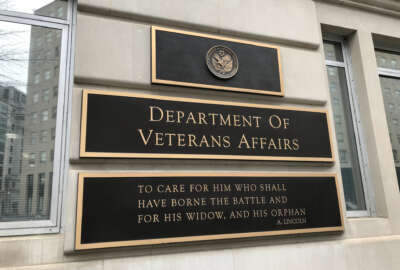A long awaited bill will improve things for veterans
"For the populations that are affected by this particular legislation, I think it is fairly monumental," said Paralyzed Veterans of America's Heather Ansley.
Veterans groups have praised passage of a bill to expand benefits once again. Congress passed the Elizabeth Dole 21st Century Veterans Healthcare and Benefits Improvement Act shortly before Christmas. For how it will help, the Federal Drive with Tom Temin turned to the Chief Policy Officer of Paralyzed Veterans of America, Heather Ansley.
Interview transcript:
Tom Temin And just give us a little bit of the genealogy of this bill. Some of the provisions have bounced around for a while. It sounds like Congress kind of swept up a bunch of things and finally got it passed.
Heather Ansley That’s exactly right, Tom. There are several of these provisions that have been introduced over a few Congresses and earlier in this congressional session. Congress started the idea of putting together a lot of these various veterans bills into one package, and that percolated for the better part of this of this year before it finally made it across the finish line and to the President’s desk.
Tom Temin And is this as landmark as, say, the Pact Act or the earlier bill, which greatly expanded community care? Or is it maybe a little more modest of a bill than those?
Heather Ansley I think that’s a good question. Those were certainly monumental bills that really had a very unique focus. And I think, for the populations that are affected by this particular legislation, I think it is fairly monumental. Certainly, there are some things that are maybe not quite as memorable, as you mentioned PACT and a few other pieces of legislation that have really been key in the last few years. But certainly a lot of provisions that will help veterans and their families and caregivers.
Tom Temin And what do you think from the standpoint of the paralyzed veterans or those with other types of disabilities are top of the list?
Heather Ansley Well, one of the things: This package of bills was named after [former] Sen. Elizabeth Dole (R-N.C.), and that really came from the Elizabeth Dole Home Care Act, which was one of the main provisions that we were pushing, which was to increase access to home and community based care for veterans with catastrophic disabilities, such as our membership that has spinal cord injuries or ALS or MDS. And really, what this bill does is it makes sure that those home care programs are available and accessible to them and provides more coordination as they move between various programs with the overall goal, knowing that many veterans want to age in their home or in the case of our members, they have lifelong needs for home care and that’s really their preference. And institution is is certainly something that they might need at some point, living in a facility. But for the most part, they prefer to remain at home.
Tom Temin Right. And as you point out, this was an omnibus. There’s about 10 or 12 different separate bills for veterans wrapped up into a … I guess you’d call it a veterans omnibus bill. But some of it is kind of arcane, but might actually make a big difference, such as making sure that community care providers get the records back to [the Department of Veterans Affairs], this kind of thing, which sounds inside baseball but can probably have a big effect on the quality of service rendered.
Heather Ansley That’s hugely important for the veterans who VA is coordinating their care, making sure that VA is getting that information back. Making sure also that we are using the funding that’s available as efficiently as possible. If care is being provided on the outside and the records don’t come back and care has to be sent out again or provided in the V.A., then that’s not a very efficient use of funding. So making sure that if we’re paying for care in the community that those results are coming back and are then able to be used in coordinating that veterans care and moving them and the path forward, that’s really an important thing, not only for veterans, but also just the VA health care system as a whole.
Tom Temin Another provision in here that kind of caught my eye: It was the [Caregiver Outreach and Program Enhancement (COPE)] Act is included in this, which would recognize the mental strain often experienced by caregivers of certain veterans by providing community mental health grants. So that could be maybe spouses or roommates or people that have to take care of people that have significant disabilities. And that’s really not an easy life, is it?
Heather Ansley No, we’re really recognizing more and more not only the role of of caregivers, family caregivers, but also understanding what the impact of giving that type of care has on the person. Particularly, in the case of some of our members, we have spouses who have been providing care for decades for their spouse. We have parents providing care for their adult children, adult children providing care for their parents. It really is the full spectrum of family members. And if we can keep those family members from burning out, from not being able to provide that care, that’s better for them and it’s better for the veteran.
Tom Temin We’re speaking with Heather Ansley. She’s chief policy officer of the Paralyzed Veterans of America. And presumably this will be signed into law by the President by the time this airs. And your sense is that this would maybe make some demands on the Veterans Affairs Department itself?
Heather Ansley Yes, it certainly will have some requirements for the VA in terms of how they administer their home care programs, their community care program, other programs under the purview of the agency. And we know that there was a lot of going back and forth with the agency and Congress. So hopefully, this will not only be something that will meet the needs of veterans, but also will will be done in a way that VA can quickly and efficiently implement it and get the requirements put into place.
Tom Temin And it would help VA deal with outside contracted work. One provision here, the modernization of VA Disability Benefits Questionnaires Act, so that data gathered is compatible with VA’s own systems such that when they talk to people that are claiming disability compensation, that the forms that they use will work in VA’s processing systems.
Heather Ansley In fact, now a great number of the compensation and pension exams that veterans need for benefits are done on the outside. They are not done within the VA. And we’ve seen numerous problems with veterans not getting quality exams such that then, when you come back, you appeal and you’re going to be sent back constantly to get the exams. So making sure that veterans are getting quality exams the first time is a priority for us. That means making sure that the data is collected in a way that VA can use it. But also, something else, just to put in a plug for is that making sure that VA is working appropriately with its contractors that it’s sending veterans to so that veterans are being sent to the specialists who can actually look at the disability issues that are being claimed and can provide a quality exam.
Tom Temin So it sounds like a lot of things that have been long sought, some of these go back several years, are finally there and it’s just a matter of VA getting around to it.
Heather Ansley Yes. And really, now that we’ve got, I’ll say a road map, a variety of places that that Congress basically has said from this last session these are areas that we want the VA to to act in. We hope that this will not only improve care for veterans services for their caregivers, but will also help the VA be more efficient with the resources that it has.
Copyright © 2025 Federal News Network. All rights reserved. This website is not intended for users located within the European Economic Area.
Tom Temin is host of the Federal Drive and has been providing insight on federal technology and management issues for more than 30 years.
Follow @tteminWFED






